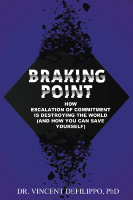
Image by Gerd Altmann
They say that “what goes around comes around.” This simple phrase essentially amounts to one central principle — in life, you receive whatever you give. The concept, called karma, is a fundamental doctrine of both Buddhism and Hinduism.
My intention is to live by this principle each day of my life. I want to give more than is expected of me and hope to later reap the rewards of my hard work.
First, though, it requires sowing the seeds that will provide those rewards.
Is Karma Only Negative?
When some people hear the word “karma,” they associate a negative connotation. But karma is a philosophy of causality — that everything has a cause and an effect, every action has a reaction. Everything we do either causes a negative or positive effect. It’s as simple as that. If we apply this philosophy to how we live our lives, we work toward becoming the best version of ourselves.
One way to think about karma is to think of yourself as a creator. This means that to make things happen in your life, you need to act — to be a doer. You can’t wait for things to fall into your lap.
For example, if I want to start my own clothing brand, I should start researching the industry, defining my target market, and developing a marketing plan. I should evaluate my own strengths and weaknesses, as well as the opportunities and threats within the industry. Next, I should start forming my business plan and determining how to secure funding for my startup.
Obviously, there are more steps to the process. The point is that to start a business, you must ask yourself each day what is needed to move the idea forward and make it a reality. Serial entrepreneur Gary Vaynerchuck said that if a startup founder wants to be successful, they need to put at least 18 hours a day for the first year. When you put your full focus, energy, effort, and dedication into your goals, they in turn produce great success.
Being the Catalyst
You have the power to shape and control your life. You are not a tree rooted in one place. You need to be the catalyst for achieving your goals.
When I started my career in finance, my conduit was the phone. I used the phone to contact prospective investors, making 300-400 phone calls a day and actually speaking to 30-40 investors daily. I experienced a significant amount of rejection and heard a lot of nos, but I believed each one got me closer to a yes.
When I started to experience some success, my friends and colleagues told me I was lucky. Yet I created my own luck by picking up the phone each day. I created positive karma — what I gave was what I got.
Creating Good Karma
Essentially, creating good karma through hard work enables you to build the life you desire and deserve. Your hard work earns you as much love, happiness, and success as the universe has to offer. If your focus is on doing good and helping others, good things will happen to you. You’ll attract great people in your life.
If you think and feel positive, that positive energy radiates to your surroundings and people will be drawn to you. The karma you’ve created will elevate you to successful circles among people who’ve accomplished great things in their lives. These people further motivate you to become the best version of yourself. They radiate good energy and habits. You can learn by just watching, listening, and following their lead. This is your circle of influence.
Your present life represents how you perceive yourself along with the decisions that you’ve made. Your thoughts, emotions, and actions are all creating effects. When you understand that everything has cause and effect, that the actions and steps you take today will have an impact on your tomorrow, you have the ability to create your reality — and even a new reality if you’re not satisfied with your current situation. If the effects aren’t what you envisioned, change the causes.
Karma comes from believing that you can make anything happen if you try. Nothing is impossible.
10 Steps to Creating Positive Karma
Success doesn’t happen from chance or luck, but is created from within. Follow these 10 steps to creating positive karma and a successful life:
-
Help others. Always do good. Do no harm. Practice acts of kindness.
-
Be self-aware. Be mindful of your thoughts and actions. Work toward improving yourself each day.
-
Act without expecting anything in return. Have the intention of creating value for others.
-
Strive for self-improvement. Continue to develop your strengths and work on minimizing your weaknesses.
-
Develop empathy. Put yourself in someone else’s shoes so you may understand them better. Through understanding, you can be of better service.
-
Practice forgiveness. Forgive others for any offenses. The greatest gift you can give someone — and yourself — is forgiveness.
-
Create positive energy. Carry a positive attitude. Lead with positive actions and words.
-
Surround yourself with positive influences. Create a circle of positive friends and people. Read about successful entrepreneurs, inventors, and professionals within your industry. Study their good habits and behaviors.
-
Be generous to others. Give generously of your time, knowledge, kindness, and support. It doesn’t always have to be about money.
-
Be grateful. Count your blessings each day. Smile, laugh, enjoy each moment of the journey. Make life fun and don’t let obstacles or setbacks diminish the light in your life.
Look deep inside yourself to unlock your true potential. In doing so, you build good karma and can become the best version of yourself.
Copyright 2023. All Rights Reserved.
Adapted with permission of the author.
Book by this Author:
BOOK:Braking Point
Braking Point: How Escalation of Commitment is Destroying the World (and How You Can Save Yourself)
by Vincent deFilippo
 Lately, we’ve been hearing a lot about things “escalating” – in a bad way. One way or another, we have fallen victim to “escalation of commitment” – better known as EOC. We are hard-wired to make mountains out of molehills, pour gasoline on a fire, spiral out of control, go over the edge, cross the line, and say things better left unsaid. And, like lemmings racing over a cliff, we seem almost fated to go too far. Despite reason and common sense telling us to quit while we’re ahead, to cut our losses, to get out while we can, something keeps us escalating the crazy.
Lately, we’ve been hearing a lot about things “escalating” – in a bad way. One way or another, we have fallen victim to “escalation of commitment” – better known as EOC. We are hard-wired to make mountains out of molehills, pour gasoline on a fire, spiral out of control, go over the edge, cross the line, and say things better left unsaid. And, like lemmings racing over a cliff, we seem almost fated to go too far. Despite reason and common sense telling us to quit while we’re ahead, to cut our losses, to get out while we can, something keeps us escalating the crazy.
By understanding specific EOC motivations and effective strategies to diminish them, more effective decision-making can result. With this in mind, Braking Point offers a detailed look at why we often get swallowed up in EOC scenarios and how we can avoid them. It’s an essential resource for anyone looking to enhance their decision-making capabilities in any area of their life.
For more info and/or to order this book, click here. Also available as a Kindle edition.
About the Author
 Dr. Vincent DeFilippo, DBA, MBA, is a professor in the School of Accounting and Business at Monroe College. Prior to that he was CEO of a private equity fund in Hong Kong, raising several billion dollars in venture capital for entrepreneurs and publicly traded companies throughout the Asia Pacific Region.
Dr. Vincent DeFilippo, DBA, MBA, is a professor in the School of Accounting and Business at Monroe College. Prior to that he was CEO of a private equity fund in Hong Kong, raising several billion dollars in venture capital for entrepreneurs and publicly traded companies throughout the Asia Pacific Region.
His new book Braking Point: How Escalation of Commitment Is Destroying the World (and How You Can Save Yourself), (ViennaRose Publishing, May 3, 2023), is a Wall Street Journal #2 bestseller.
Learn more at VincentDeFilippo.com.























